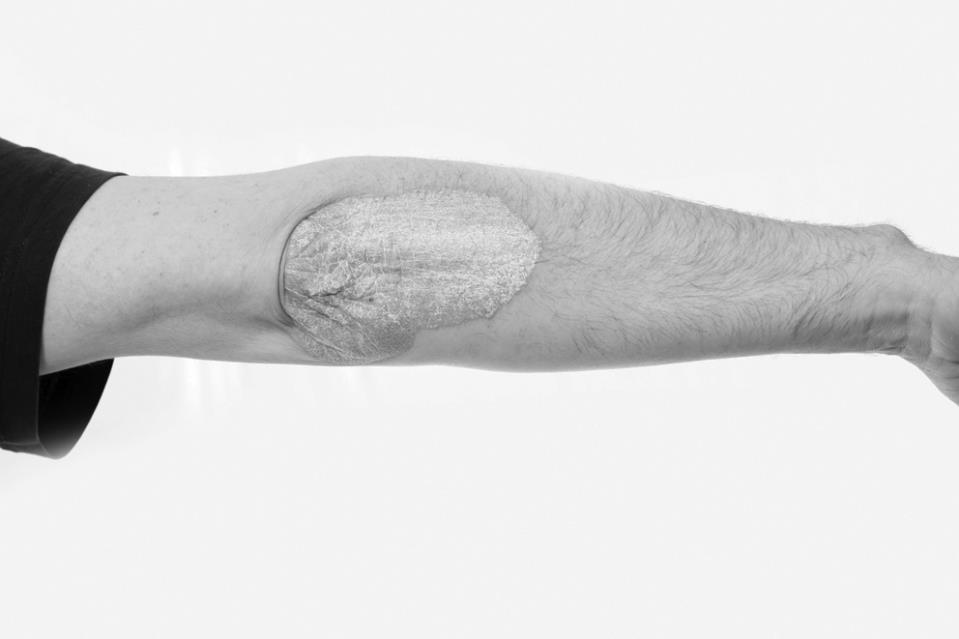Skin conditions can be some of the hardest to deal with. We regularly read about how acne can cause teenagers to be severely depressed, or how eczema can mean children are teased or rejected at school.
But while these more-common conditions are very trying for those enduring them, there are often long-term cures in sight. For psoriasis, on the other hand, there is no cure.
Marc Paris knows that only too well. He explains that he had had dry skin throughout his teens so, when the condition first surfaced, he assumed it was just a bad case of eczema.
"However, when the red patches appeared on my elbows, my mother thought it would be a good idea to take me to the doctor's," he explains. "We have other family members with psoriasis, so that particular location set alarm bells ringing for her. It turned out my mum was right. I was diagnosed with psoriasis.
"I was about 14 at the time and absolutely devastated. When you're a teenager, you're so image conscious and you obsess about what other people might think if they see your blotchy, red skin. I didn't quite know how to handle it or what the future would hold."

As Marc soon discovered, psoriasis causes red, flaky, crusty patches on the skin. These patches are normally on the elbows, knees, scalp and lower back but they can appear anywhere on the body, leading to skin that is unsightly, sore and itchy.
Marc admits that he took the diagnosis badly at first and literally didn't feel comfortable in his own skin. "I tried to hide the areas that were raised and red as I felt they were unsightly. It isn't the best thing for your self-esteem when you see your skin turn scaly. It's off-putting, to say the least.
"However, in time, I came to terms with it. I knew that psoriasis had become part of my life and now I am aware that I will have to live with it for the rest of my life. Once I accepted that, I stopped feeling so stressed the way it looks and what people think of me."
Over the years Marc has tried all sorts of treatments including steroid creams and light therapy. "They all worked very well to begin with, but it would simply take some exam stress or another problem to make me flare up again. It's a constant battle and you have to stay on top of your treatment at all times, otherwise it is useless. The fact that I am quite a worrier doesn't help to keep my psoriasis under control.
"It is quite difficult knowing there is no cure but you do get used to it," he continues. "I had to change my lifestyle in many ways. For instance, I used to smoke like a chimney, and I had to quit. That instantly helped my skin to clear up. Tobacco and alcohol are both your enemies when it comes to psoriasis so the best way to control it, or keep it at bay, is by cutting those out of your life."

Now, Marc is pleased that his condition has improved dramatically, helped by the fact that he is taking Vitamin D tablets and using a topical steroid cream. "It's almost completely gone," he smiles, "and I really hope to avoid future flare ups too. The Vitamin D has really helped, and so has taking the time to sunbathe and soak up some rays. Still, I have to use lots of sunscreen as sunburn could aggravate the condition too.
"Of course, the worst thing about the condition will always be other people's reactions to it, such as exclaiming in horror when they see my skin. That really used to bother me at first but I've learnt to accept that people simply don't understand the condition. Yes, it's something I have to live with, but I am very happy to have learnt how to keep it under control."
Backing up Marc's thoughts on his condition, consultant dermatologist Dr Lawrence Scerri explains that, as psoriasis is a chronic condition, most sufferers will have to live with it for life.
"Often there is a genetic basis to psoriasis so, as with Marc's case, you will usually find that there is a family history behind the diagnosis, and that some people are prone to it while others are not.
"Unfortunately, psoriasis can be severe and, in around 15 per cent of cases, it can even lead to a type of arthritis. Either way, it occurs in phases, with flare ups triggered by stress and other factors. Naturally, a skin condition of this kind is hard enough to deal with, but the psychical and social effects of it can also be detrimental and are sometimes underestimated."
Dr Scerri explains that 70 per cent of patients are able to keep their condition under control thanks to topical agents and lifestyle changes, although the remaining 30 per cent do require systematic treatment by mouth, injections and UV therapy, all of which can be administered through Boffa Hospital.
"Whichever way you look at this, psoriasis care is a lifelong regime and a huge commitment so it should never be trivialised as 'just a skin condition'," Dr Scerri stresses. "Like so many other skin conditions it can significantly impair a patient's quality of life and thus needs a lot of attention.
"With that in mind, I would really encourage people to educate themselves on the symptoms and what the condition means. I am always so shocked when the parents of a psoriasis sufferer tell me that their child's schoolteachers have asked them to keep their child at home because of the condition.
"Psoriasis isn't infectious and this lack of insight can really make life harder for those with the condition. Education is key in making the sufferer feel as comfortable as possible while they learn to live with the condition."